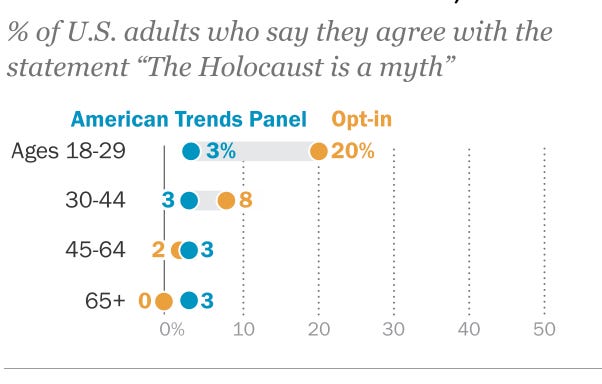Good reads & charts - March 22, 2024
In this edition: When taking polls, remember that nuance matters! Also, the story of interest rates and the global economy, more temperature records and where EVs are taking off in the US.
Good reads & charts provides an assortment of interesting articles and data that I have come across recently that do not warrant a full article and might not be related to something I have previously discussed, but I feel are worth larger consumption.Nuances in polling
A few months ago, The Economist published poll results showing 20% of young people denied the Holocaust.
Well, turns out that the poll might not have been accurate.
Pew Research recently released a study highlighting how important it is to properly set-up polls. Because when a poll is poorly designed, the results can mislead and create chaos and confusion.
In this instance, Pew noted that the Holocaust denial poll was an example of an ‘opt-in poll’. Opt-in polls are “an approach where people are not selected randomly but are instead recruited from a variety of online sources like banner ads or social media” and usually earn a reward (like $$$) for completing the survey.
In other words, people ‘opt-in’ to the poll of their own volition, not from someone actively reaching out to them to participate.
It is ‘orders of magnitude’ cheaper to do online opt-in polls compared to high-quality phone polls like those conducted by The New York Times. But opt-in polls also increase the likelihood of ‘bogus respondents who “do not answer questions sincerely; instead, they attempt to complete surveys with as little effort as possible to earn money or other rewards.”
Ultimately, this skews the poll results.
At Pew Research Center, we’ve found that this type of overreporting tends to be especially concentrated in estimates for adults under 30, as well as Hispanic adults. Bogus respondents may be identifying this way in order to bypass screening questions that might otherwise prevent them from receiving a reward, though the precise reasons are difficult to pin down. Whatever the underlying cause, the result can be unreliable estimates for those groups.
For example, in a February 2022 survey experiment, we asked opt-in respondents if they were licensed to operate a class SSGN (nuclear) submarine. In the opt-in survey, 12% of adults under 30 claimed this qualification, significantly higher than the share among older respondents. In reality, the share of Americans with this type of submarine license rounds to 0%.

Another Pew Research Center study comparing three online opt-in samples and three probability-based panels had similar findings, though on different topics. We asked respondents 16 yes/no questions on topics ranging from smoking and hypertension to collecting Social Security and receiving workers’ compensation. Young and/or Hispanic opt-in respondents were significantly more likely than other respondents to answer “yes” to 10 or more of these questions, claiming combinations of characteristics that are virtually nonexistent in reality. Critically, on the more rigorous probability-based surveys, very few respondents in any age group gave the same kind of implausible answers to these questions.
Source: Online opt-in polls can produce misleading results, especially for young people and Hispanic adults (Pew)
The upside? 20% of young Americans are not Holocaust deniers (Pew puts the percentage at around 3%, consistent with other age groups)

The downside? We still have a long way to go to ensure the data we are looking at accurately represents a given population.
We already have enough chaos and confusion without improperly designed polls adding fuel to the fire.
Interest rates and the global economy
After eight years of bottom-of-the-barrel rates, earlier this week the Bank of Japan finally raised interest rates.
Below is a chart tracking how the central banks in a wide swath of countries have reacted since February 2020. It is a really fascinating look at the global economic situation the past four years.
Some notable countries you might be interested in:
Keep reading with a 7-day free trial
Subscribe to Nuance Matters to keep reading this post and get 7 days of free access to the full post archives.



